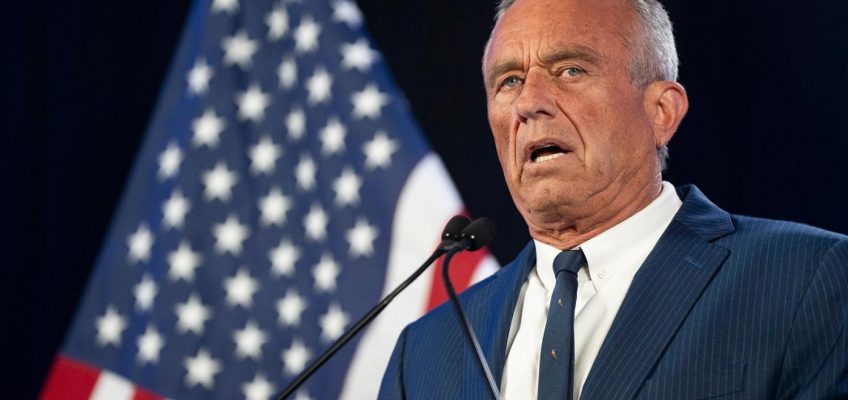Regarding Robert F. Kennedy Jr., there is little middle ground — people either love him or hate him. Which is why, after President-elect Donald Trump nominated him to head the Department of Health and Human Services, the haters came out. Legal health care expert Lawrence Gostin said of the nomination, “I can’t think of a darker day for public health and science.” (Really? The COVID-19 and AIDS pandemics weren’t darker days?) Discussing Trump demands hyperbole.
Now there is ample reason for polarity about Kennedy. Put bluntly, if he says 10 things, one is true, four have some truth and five are total nonsense. On health matters, Kennedy is prone to exaggeration and outright fabrications. No, 5G wireless technology doesn’t control our behavior; government organizations are not deliberately poisoning Americans and the coronavirus vaccine is not the “deadliest virus ever made.” But he is hardly the only one in Washington, Republican or Democrat, telling tall tales.
The flip side is that Kennedy has one undeniable strength — identifying critical problems contributing to poor American health. Even his critics must acknowledge that the HHS and the agencies it controls, including the Centers for Disease Control and Prevention and the Food and Drug Administration, have downplayed these matters. Whatever else is said about Kennedy, he is unafraid to ask hard questions, which sclerotic government organizations have been slow to address. His strength and weaknesses should be balanced when determining if he would be a good leader of HHS.
Whether he will be confirmed will be a decision by the U.S. Senate as part of the separation of powers. If he is confirmed, rather than tilting at windmills, he should set the agenda on the following critical issues:
Obesity
To attack the obesity epidemic, America needs a Manhattan Project.
Kennedy recognizes obesity as the greatest threat to the country’s health since the surgeon general issued a report on smoking in 1964. The national 40% obesity rate was an important factor in the elevated death totals during the COVID-19 pandemic and helps account for the disconnect between health care spending and poor patient outcomes. The solution needs to be multipronged and include exercise programs, behavior modification, anti-obesity medications and a scrupulous analysis of the American diet with especial attention to the use of high fructose corn syrup.
Autism
Like obesity, childhood autism has experienced a frightening rise. It is not simply an increase in diagnosis, and contrary to Kennedy, it was not caused by vaccines — large research studies have conclusively disproved any link. Nevertheless, the problem persists for reasons unknown and requires serious investigation.
Vaccines
Our vaccines are extremely safe and effective, especially in children. But as COVID-19 demonstrated, there can be gaps in safety and effectiveness in certain groups. Vaccines must be tailored to the right patients. Kennedy should use his vaccine skepticism to encourage reliable studies to inform and reassure the American public. This includes ending the 40-year indemnification from lawsuits for vaccine manufacturers. Back then, there was little profit to be made from vaccines. Today, they are big business, and the public needs another layer of protection.
COVID-19
What was learned from the COVID-19 pandemic? Not much, as suggested by the continuing debates on lockdowns, vaccine policies, school closures, ventilation and gain-of-function research. To address these issues, we need a national nonpartisan commission on the COVID-19 pandemic based on those in the United Kingdom and Sweden. Just as we did it for 9/11.
Conflicts of interest
A lot of money is sloshing around in health care that is making rich people richer, does not benefit patients and may actually be compromising care. Kennedy must scrutinize private equity takeovers of hospitals, as well as physician-owned and financed medical centers. His office should tighten rules on the revolving door policy in which regulators, upon retirement from government, can move to high-level jobs with private companies they formerly regulated.
Related Articles
Sarah Green Carmichael: While you do 5-day RTO I’ll watch your best workers quit
Thomas Friedman: Mr. Trump, do you realize how much the world has changed since you were president?
Marc Goldwein: Biden still has time to nudge the federal budget closer to sanity
David French: Donald Trump thinks he won’t have enough power?
Jamelle Bouie: It’s a republican form of government, not a monarchy. With explicit intent
Drugs
Many of our most important drugs are too expensive. Kennedy can explore policies of increased competition by encouraging “biosimilars” and generics.
‘Settled science’
Settled science is a misnomer. New information changes science, and Kennedy can challenge the torpor of the health care community. His pet projects such as raw milk, water fluoridation and food additives all deserve greater attention, but none should distract from the crucial health issues listed above.
If confirmed, Kennedy could either be a disruptor or an ideologue. If he becomes a disruptor, that benefits the country — as long as he builds upon the disruption. He needs honest, dedicated subordinates unwilling to maintain the status quo by seeing him merely as a temporary placeholder.
Alternatively, if Kennedy becomes an ideologue, then as Frank Zappa said, there’s “trouble comin’ every day.”
Dr. Cory Franklin is a retired intensive care physician and the author of “The COVID Diaries 2020-2024: Anatomy of a Contagion As It Happened.” He wrote this column for the Chicago Tribune.


Leave a Reply